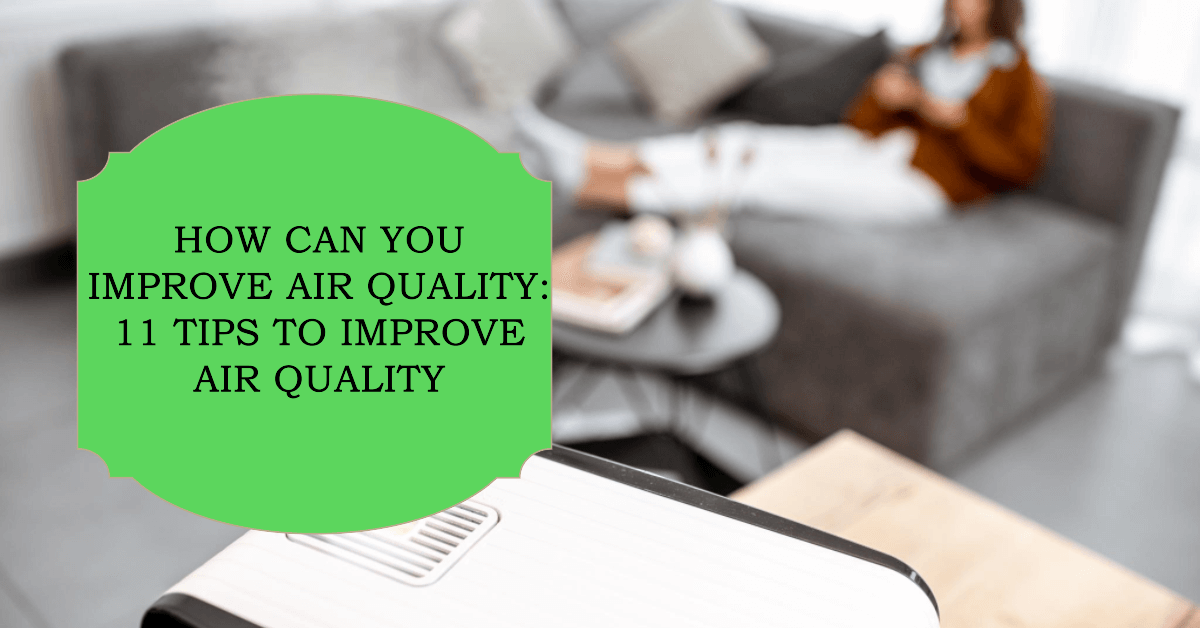How can you improve air quality in your surroundings? The quality of the air we breathe can influence our health, from our respiratory systems to our overall quality of life. In the face of mounting concerns about air pollution and its adverse effects, it’s imperative to explore actionable ways to enhance air quality.
Clean air is a necessity. The air we inhale is laden with various pollutants, some visible, while others are microscopic and imperceptible. From common allergens to harmful chemicals, air pollution is a silent assailant that can lead to a range of health issues, including respiratory problems, allergies, and more severe conditions. Understanding the significance of air quality is the first step towards adopting a healthier and more environmentally conscious lifestyle.
Improving air quality extends beyond individual benefits. How Can I Improve Air Quality in a way that benefits not only yourself but others also? Many people are buying Air purifiers for it but In this article, we’ll explore 11 practical tips to help you breathe cleaner, healthier air. These tips will empower you to take control of the air you breathe.
Understanding Air Quality
Before we dive into the tips on “How can you improve air quality”, let’s grasp the fundamentals of air quality. Air quality refers to the condition of the air in your immediate environment, which can significantly impact your well-being and the planet. Clean air is essential for maintaining good health, while poor air quality can lead to various health issues and environmental concerns. As we move forward, you’ll discover why improving air quality should be a top priority for everyone.
Why Improving Air Quality is Essential
Air quality plays a vital role in determining the quality of life. Here are a few key reasons why improving air quality is of utmost importance:
- Health Implications: Poor air quality is linked to respiratory problems, allergies, and even serious illnesses. Breathing clean air reduces health risks.
- Environmental Impact: Bad air quality contributes to climate change and can harm ecosystems. Cleaner air is crucial for a sustainable planet.
- Quality of Life: Clean air promotes a better quality of life, with improved concentration and overall well-being.
Now we will start with 11 tips on “How Can You Improve Air Quality” or “How Can I Improve Air Quality“
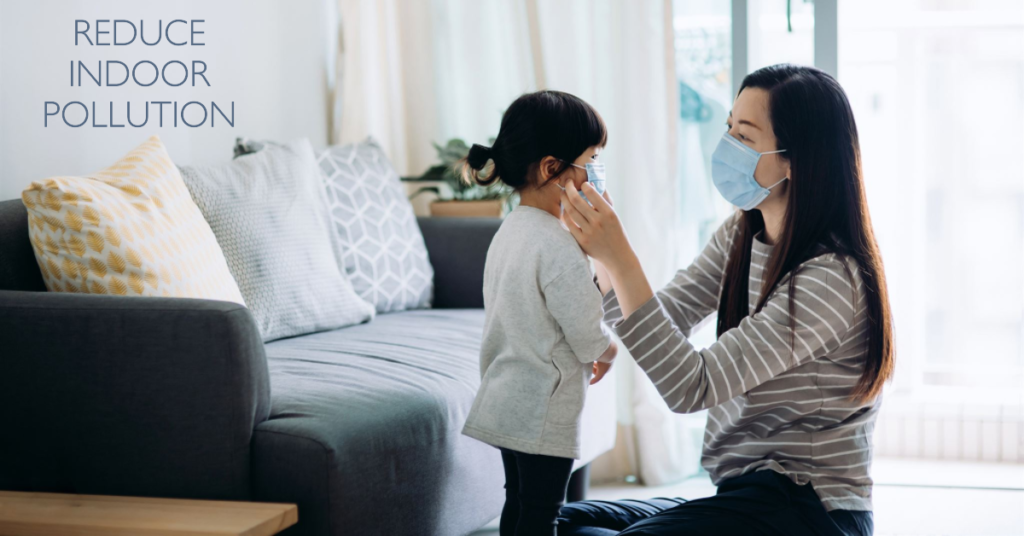
Tip 1: Reduce Indoor Pollution
How Can You Improve Air Quality by Reducing Indoor Pollution?
Reducing indoor pollution is a crucial step in improving air quality within your home. Indoor pollution can be caused by various sources, including smoking, household cleaning products, and even the materials used in your furniture and decorations. By taking the following steps, you can make a significant impact on the air you breathe:
- Avoid Smoking Indoors: Smoking is a major indoor air pollutant. If you smoke, consider taking your smoking habits outdoors to minimize the release of harmful chemicals and secondhand smoke indoors.
- Use Natural Cleaning Products: Common household cleaning products often contain volatile organic compounds (VOCs) and other chemicals that can negatively affect indoor air quality. Opt for natural cleaning alternatives like vinegar, baking soda, and lemon for a safer and cleaner home environment.
- Proper Ventilation: Ensuring your living space is well-ventilated can help dilute indoor pollutants and improve air quality. Opening windows and using exhaust fans can go a long way in reducing indoor pollution.
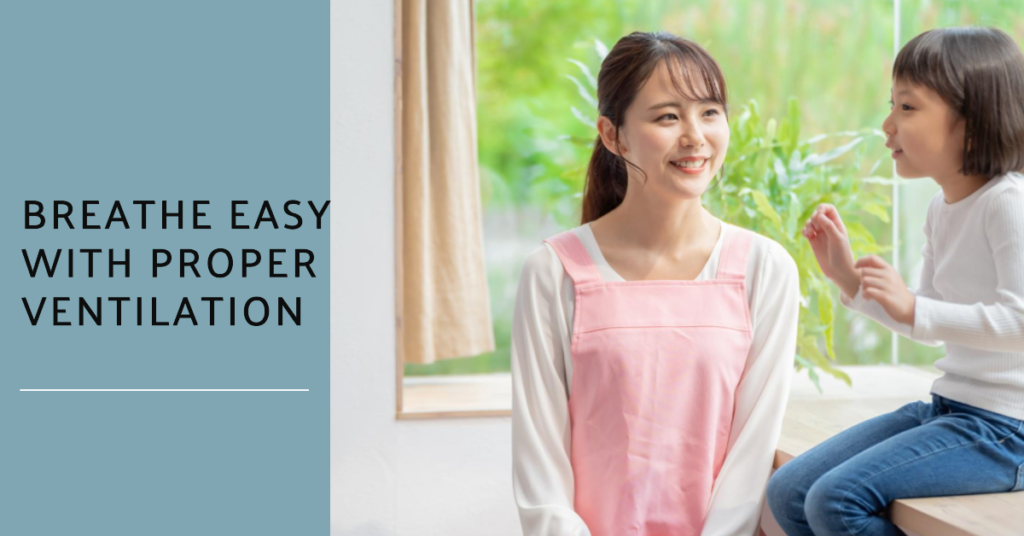
Tip 2: Proper Ventilation
How Can I Improve Air Quality through Proper Ventilation? Proper ventilation is a fundamental factor in enhancing indoor air quality. Effective ventilation can help remove indoor pollutants and provide a constant flow of fresh, clean air. Here’s how you can achieve better ventilation and breathe cleaner air:
- Open Windows and Doors: A straightforward way to improve ventilation is by opening windows and doors regularly. Allowing outdoor air to circulate inside your home can help dilute indoor pollutants.
- Use Exhaust Fans: In areas like the kitchen and bathroom, where pollutants can accumulate, exhaust fans are valuable tools. They help expel indoor air and replace it with fresh outdoor air, reducing indoor pollution.
- Consider an Air Exchange System: For a more comprehensive approach, consider installing an air exchange system. These systems are designed to bring in fresh outdoor air while expelling indoor air, ensuring a constant supply of clean, fresh air.
. Here are some tips for enhancing ventilation:
| Tip | Description |
|---|---|
| Open windows and doors | Regularly allow fresh outdoor air to circulate inside your home. |
| Use exhaust fans | Install and use exhaust fans in kitchens and bathrooms to remove pollutants. |
| Consider an air exchange system | An air exchange system can help bring in fresh outdoor air while expelling indoor air. |
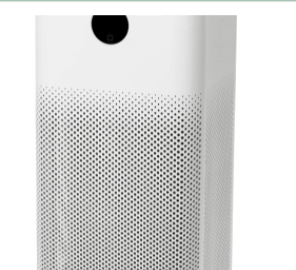
Tip 3: Use Air Purifiers
How Can You Improve Air Quality with Air Purifiers? Air purifiers are essential appliances for cleaning the air in your home. They are particularly effective in removing allergens, dust, and harmful particles from the air. To get the most out of air purifiers and improve air quality:
- Select the Right Air Purifier: When choosing an air purifier, consider your specific needs. For example, if you have allergies, a purifier with HEPA filters is a great choice, as it can trap allergens effectively.
- Strategic Placement: Place air purifiers in rooms where you spend the most time, such as the bedroom and the living room. This ensures that you breathe clean air in the areas where it matters most.
- Regular Maintenance: Just like any other appliance, air purifiers require regular cleaning and maintenance to function at their best. Follow the manufacturer’s guidelines for filter replacement and general upkeep to ensure optimal performance.
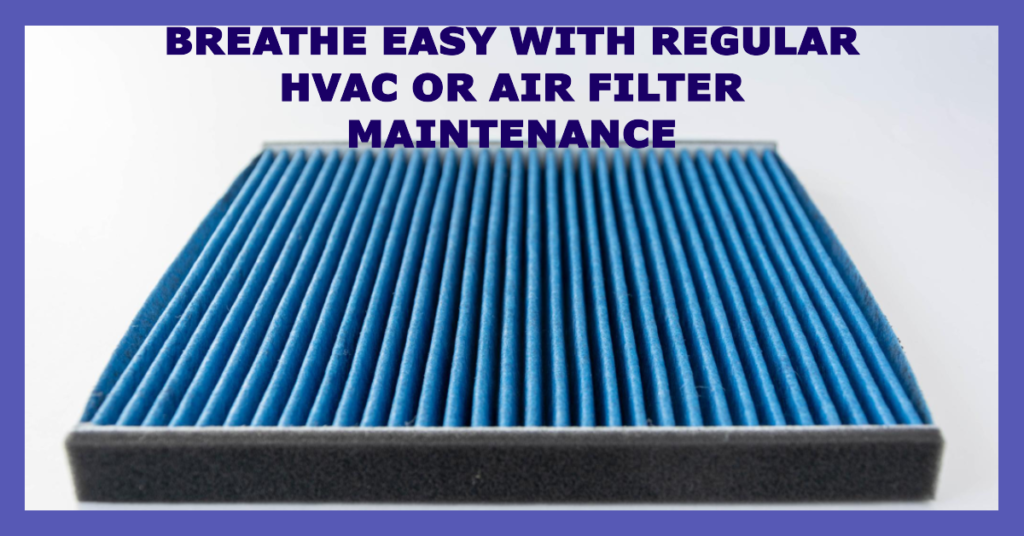
Tip 4: Regular HVAC and Air Filter Maintenance
How Can I Improve Air Quality with Regular HVAC and Air Filter Maintenance? Your heating, ventilation, and air conditioning (HVAC) systems or Air Filters play a crucial role in indoor air quality. Regular maintenance is essential to prevent issues that can compromise air quality. Here’s how you can ensure your HVAC system or Air Filter supports cleaner air:
- Clean or Replace Filters: HVAC filters capture dust, allergens, and pollutants from the air. Regularly clean or replace these filters (typically every 1-3 months) to maintain efficient filtration.
- Inspect for Leaks: Annually inspect your HVAC system for leaks or blockages. Leaks can release harmful gases, affecting air quality and energy efficiency.
- Professional Maintenance: Bi-annual professional maintenance is highly recommended. HVAC technicians can perform comprehensive checks, cleaning, and tune-ups to keep your system running smoothly and ensuring cleaner air throughout your home.
| Task | Frequency | Description |
|---|---|---|
| Clean or replace filters | Every 1-3 months | Filters trap dust and pollutants, so clean or replace them regularly. |
| Inspect for leaks | Annually | Check for any leaks or blockages in your HVAC system. |
| Professional maintenance | Bi-annually | Hire a professional for a comprehensive HVAC system check-up. |
Tip 5: Reduce Smoking and Secondhand Smoke
How Can You Improve Air Quality by Reducing Smoking and Secondhand Smoke? Smoking and secondhand smoke are major contributors to indoor air pollution and can significantly affect the quality of the air you breathe. To reduce their impact and enhance air quality:
- Quit Smoking: If you smoke, consider quitting for the sake of both your health and indoor air quality. Smoking indoors not only harms you but also pollutes the air with harmful chemicals.
- Create Smoke-Free Zones: Designate specific smoke-free areas in your home and encourage family members and guests to smoke outside. This prevents secondhand smoke from infiltrating indoor air.
- Air Purifiers with Specialized Filters: For additional protection, use air purifiers equipped with specialized filters designed to capture and neutralize smoke particles. These purifiers are effective in reducing the presence of harmful smoke compounds in the air.
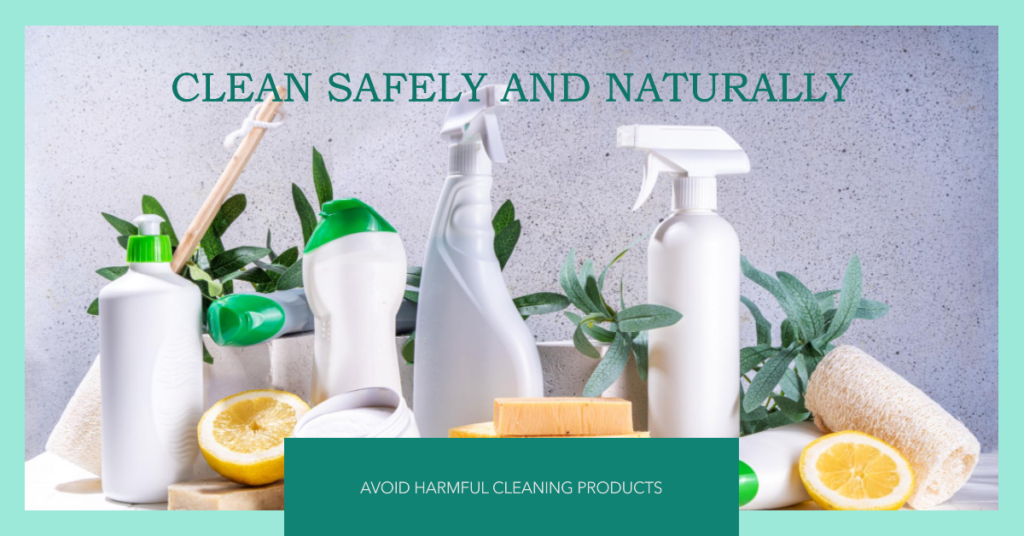
Tip 6: Avoid Harmful Cleaning Products
How Can I Improve Air Quality by Avoiding Harmful Cleaning Products? Common household cleaning products often contain volatile organic compounds (VOCs) and other chemicals that can negatively affect indoor air quality. To maintain cleaner indoor air, consider these alternatives:
- Multi-Purpose Cleaners: Create your cleaning solutions using natural ingredients like vinegar, baking soda, and lemon. These alternatives are just as effective in cleaning and are much safer for your indoor air quality.
- Aerosol Sprays: Opt for non-aerosol alternatives for disinfecting and air freshening. Aerosol sprays release fine particles into the air, potentially degrading air quality.
- Floor Cleaners: Choose water-based or non-toxic floor cleaners without harsh chemicals. These products effectively clean floors without compromising indoor air quality.
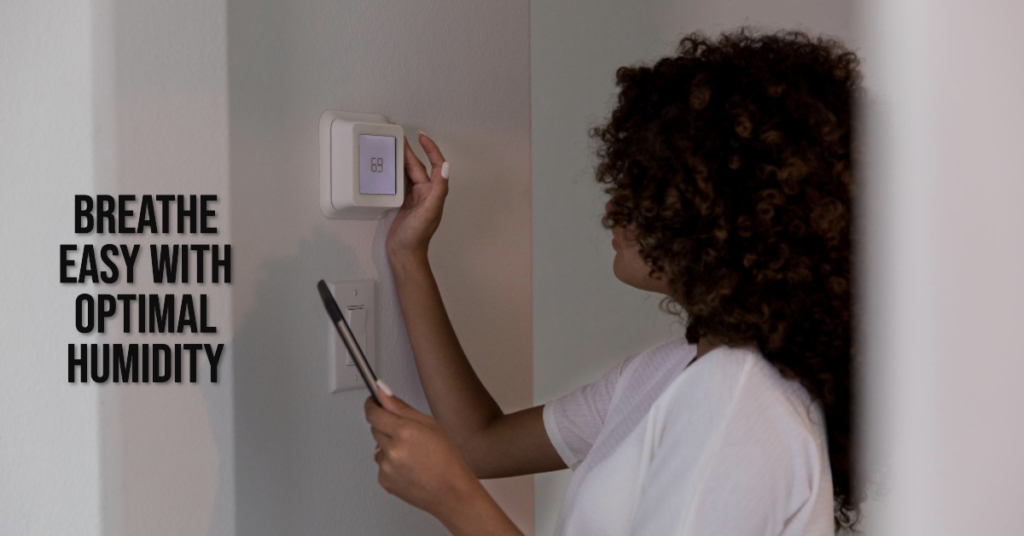
Tip 7: Control Humidity
How Can You Improve Air Quality by Controlling Humidity? Maintaining the right humidity levels in your home is essential for improving air quality. Ideal indoor humidity levels range from 30% to 50%. Here’s how you can control and optimize indoor humidity:
- Use a Hygrometer: A hygrometer is a simple tool to measure indoor humidity. It allows you to monitor humidity levels and make necessary adjustments.
- Dehumidifiers: If indoor air is too humid, consider using a dehumidifier to remove excess moisture. High humidity can promote mold growth and reduce air quality.
- Humidifiers: In drier climates or during the winter months, consider using a humidifier to add moisture to the air. This can help prevent dry skin, irritated eyes, and respiratory discomfort.
Humidity levels in your home can affect air quality. Here’s how to maintain optimal indoor humidity:
- Use a hygrometer to monitor humidity levels. Ideal indoor humidity ranges from 30% to 50%.
- Use a dehumidifier if your indoor air is too humid, and consider using a humidifier if it’s too dry.
- Regularly clean and vacuum your home to reduce dust mites and pet dander.
- Wash bedding and curtains in hot water to eliminate allergens.
- Consider using allergen-proof covers on pillows and mattresses for added protection.
- Use exhaust fans while cooking to remove smoke, steam, and cooking odors.
- Cook with lids on pots and pans to reduce the release of cooking byproducts into the air.
- Consider investing in a kitchen air purifier to capture cooking-related pollutants.
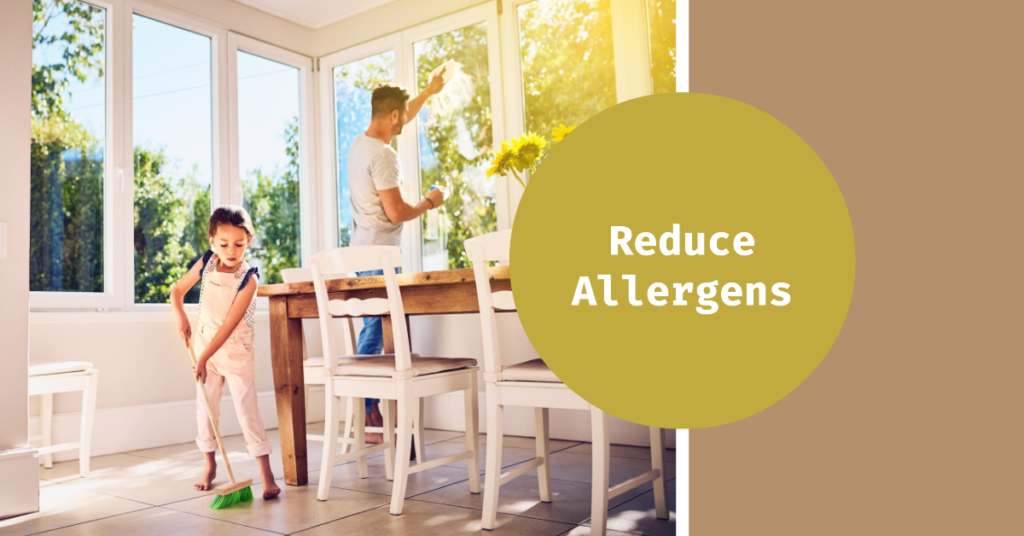
Tip 8: Reduce Allergens
How Can I Improve Air Quality by Reducing Allergens? Common indoor allergens like dust mites, pet dander, and pollen can affect air quality, especially for those with allergies or respiratory issues. To minimize allergens and breathe cleaner air:
- Regular Cleaning: Frequent cleaning, including dusting and vacuuming, can help reduce dust mites and pet dander in your home.
- Wash Bedding and Curtains: Wash your bedding and curtains regularly in hot water to eliminate allergens that can accumulate.
- Allergen-Proof Covers: Consider using allergen-proof covers on pillows and mattresses to create barriers that prevent allergens from infiltrating your sleeping environment.
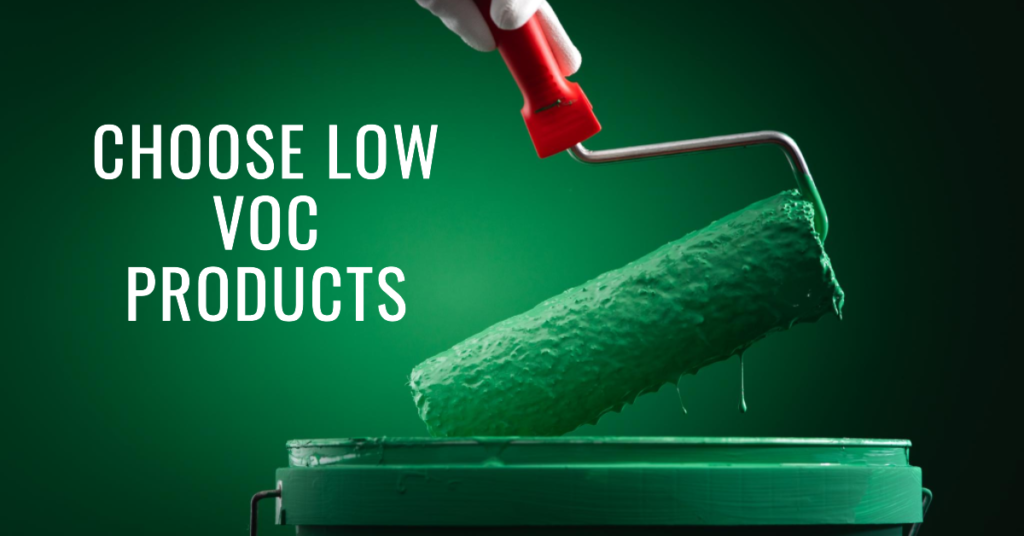
Tip 9: Choose Low VOC Products
How Can You Improve Air Quality by Choosing Low VOC Products? Volatile Organic Compounds (VOCs) are chemicals found in many household products that can evaporate into the air and reduce its quality. Opt for low VOC products to minimize their impact:
- Paints: When painting, select paints labeled as low VOC or VOC-free. These paints emit fewer harmful chemicals into the air during and after painting.
- Furniture: Choose furniture made from natural or untreated materials to avoid off-gassing of VOCs.
- Cleaning Products: Opt for cleaning products with no or low VOCs to reduce indoor air pollution while maintaining a clean home environment.

Tip 10: Proper Cooking and Ventilation
How Can I Improve Air Quality by Proper Cooking and Ventilation? Cooking can introduce pollutants into your indoor air. To ensure your cooking habits don’t compromise air quality:
- Use Exhaust Fans: Whenever you cook, use exhaust fans to remove cooking-related pollutants, such as smoke and steam, from the air.
- Cook with Lids On: Cooking with lids on pots and pans helps reduce the release of cooking byproducts into the air.
- Kitchen Air Purifier: Consider investing in a kitchen air purifier with specialized filters that can capture cooking-related pollutants, ensuring cleaner air in the kitchen and beyond.
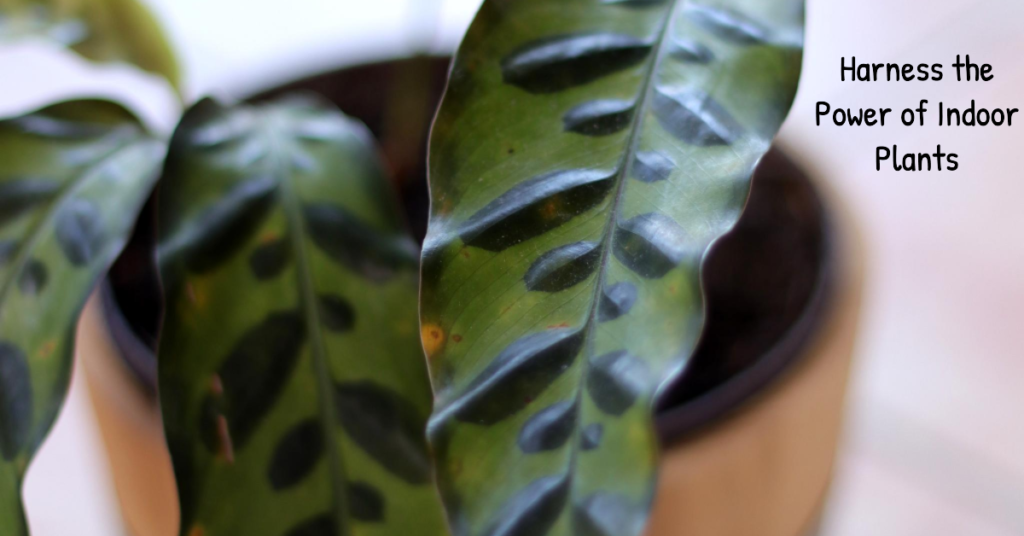
Tip 11: Harness the Power of Indoor Plants
How Can You Improve Air Quality with Indoor Plants? Indoor plants not only bring natural beauty to your home but also serve as natural air purifiers. They are effective at removing common indoor air pollutants and improving air quality. Here’s how to harness the power of indoor plants for cleaner air:
- Select Air-Purifying Plants: Certain plant varieties are particularly effective at cleaning the air. Spider plants, snake plants, peace lilies, and pothos are known for their air-cleansing abilities.
- Strategic Placement: Place air-purifying plants in various rooms of your home to maximize their air-cleansing potential. Bedrooms, living rooms, and kitchens are excellent places for these plants.
- Proper Care: Maintain your indoor plants by ensuring they receive adequate sunlight, water, and nutrients. Healthy plants are more effective at purifying the air.
Indoor plants are like nature’s air purifiers. They work their magic by absorbing gases through small openings on their leaves, a process known as transpiration. During transpiration, plants take in air pollutants and release oxygen, making the air cleaner and fresher. Additionally, the microorganisms present in the soil of potted plants can further break down harmful compounds.
When choosing indoor plants for air purification, consider options like spider plants, snake plants, peace lilies, and pothos. These plants are known for their air-cleansing abilities and are relatively low-maintenance, making them perfect for those new to indoor gardening. Be sure to place these plants in well-lit areas and water them as needed to keep them thriving and working effectively to improve air quality in your home.
Conclusion on “How can you improve air quality”
In conclusion, improving air quality is within your reach, and it starts with simple yet effective changes in your daily life. By reducing indoor pollution, enhancing ventilation, and using air purifiers, you can significantly impact the air you breathe. Each of the 11 tips presented in this “How can you improve air quality” article offers a practical way to contribute to cleaner air and better health.
FAQ
How can I purify the air at home naturally?
There are several natural ways to improve indoor air quality:
Indoor Plants: Certain houseplants, like snake plants, spider plants, and peace lilies, can naturally filter out common indoor air pollutants.
Proper Ventilation: Regularly open windows and doors to let fresh outdoor air circulate inside your home, promoting better air quality.
Use Natural Cleaning Products: Opt for natural alternatives such as vinegar, baking soda, and lemon for cleaning to avoid harmful chemicals in traditional cleaning products.
Eliminate Smoking Indoors: Avoid smoking indoors to prevent the release of harmful smoke and chemicals into your home.
Reduce Allergens: Regularly clean and vacuum to minimize allergens like dust mites and pet dander.
Do air purifiers improve air quality?
Yes, air purifiers can significantly improve air quality. They work by filtering out particles and pollutants from the air, including dust, allergens, pet dander, and even some chemicals. High-quality air purifiers, such as those with HEPA filters, can effectively remove these contaminants, making the air cleaner and healthier to breathe. However, it’s essential to choose the right air purifier for your specific needs and maintain it regularly for optimal performance.
What causes poor air quality?
Poor air quality is often caused by various factors, including:
Outdoor Pollution: Industrial emissions, vehicle exhaust, and natural factors like wildfires can introduce pollutants into the outdoor air.
Indoor Pollution: Indoor sources like smoking, using harmful cleaning products, and off-gassing from furniture and building materials can degrade indoor air quality.
Allergens: Dust mites, pet dander, and pollen can accumulate indoors, leading to reduced air quality, especially for individuals with allergies.
Inadequate Ventilation: Insufficient fresh air circulation and ventilation can trap pollutants indoors, contributing to poor air quality.
Chemical VOCs: Volatile Organic Compounds (VOCs) released by common household products like paints, solvents, and air fresheners can contaminate indoor air.
What are the symptoms of bad indoor air quality?
Poor indoor air quality can lead to various symptoms and health issues, including:
Respiratory Problems: Coughing, wheezing, and shortness of breath.
Allergies: Increased allergy symptoms, such as sneezing, runny nose, and itchy eyes.
Irritated Skin: Skin conditions like rashes and dryness may worsen.
Headaches: Frequent headaches or migraines.
Fatigue: Feeling tired or sluggish.
Worsening of Preexisting Conditions: Poor air quality can exacerbate existing respiratory conditions like asthma or allergies.
What is the fastest way to clean the air in your house?
The fastest way to improve indoor air quality is to ensure proper ventilation. Opening windows and doors to let fresh outdoor air circulate is a quick and effective method. Additionally, using high-quality air purifiers can rapidly filter out contaminants from the air in specific rooms, providing immediate improvements.
What scent purifies the air?
Some scents, such as those from essential oils like eucalyptus, tea tree, and lavender, are believed to have air-purifying properties. These scents can create a pleasant atmosphere and may help mask odors, but they do not directly purify the air. Air purification is best achieved through proper ventilation and the use of air purifiers.
Who has the worst air quality in the world?
Air quality can vary significantly by region and can change over time due to various factors. Some cities and regions with consistently poor air quality include areas in India, China, and parts of the Middle East. However, rankings can shift, and it’s essential to refer to up-to-date air quality indexes and reports for accurate information.
DheerajSonwane is a dedicated writer with expertise in air purification technologies. He focuses on providing well-researched content to help readers improve indoor air quality in homes and businesses. As the lead writer at AirPurifierMaster.com, Dheeraj offers practical advice his insightful reviews guide individuals in choosing the best air purifiers for their needs.

